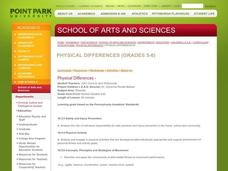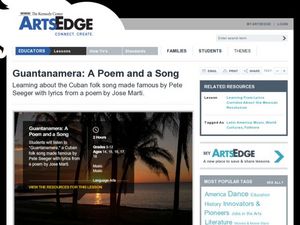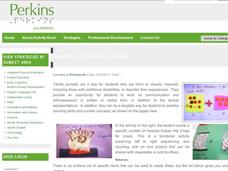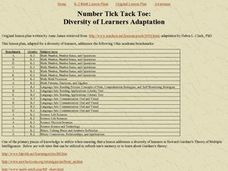Curated OER
Butterflies Fly!
Chopin was a lovely composer who played the piano masterfully. Third graders are introduced to Chopin, his piano sounds, triple meter, music patterns, movement, and the waltz. They listen to his music while hearing the story Butterflies...
Perkins School for the Blind
Learning to Express Myself
Expressing one's wants and needs is vital for learners of any age or ability level. Young children with visual impairments and intellectual disabilities practice asking for preferred items, foods, or activities in a structured manner....
Curated OER
Diversity
Students access prior knowledge of the five senses and relate to students with disabilities. In this people with disabilities lesson, students research and use a Venn diagram to compare and contrast famous people and their...
Perkins School for the Blind
High Stepping
Learners who are blind or have visual impairments learn to take high steps in order to improve their balance and mobility. They start by marching in place, and then march around the room. Finally, they attempt to step over a towel as...
Perkins School for the Blind
Learning to Identify Sounds Made by the Body
Sneeze, snap, tap, and whistle; Did I do that? Explore the parts and sounds of the human body with your learners with visual impairments. First you'll name the parts of the body, make a sound with each part, and then have the class...
Curated OER
Guantanamera: A Poem and a Song
Young scholars compare revolutionary actions of Jose Marti and Pete Seeger. In this Cuban folk song lesson, students listen to the song "Guantanamera" and discuss the content. Young scholars read articles on the poet and the songwriter...
Curated OER
Rhythm and Art: Gesture Drawing
Students make connection between music and art. In this integrated arts lesson, students complete gesture drawing activities as they listen to Cuban, flamenco, classical, jazz, and contemporary music.
Curated OER
Yes We Can! Students with Autism & Down-Syndrome on the Drums!
To learn about various topics and improve their social skills, learners with special needs play along with music on drums and other sound objects. Teachers take digital pictures of the students participation and use them to make bulletin...
Perkins School for the Blind
Taking Turns
For small children or learners with disabilities, learning to wait patiently and taking turns is very important. In pairs, two children with visual impairments take turns asking for, waiting for, and playing with a musical...
Curated OER
Move It Line Dance
The upbeat song "I Like to Move It" from the movie Madagascar is just the ticket! Get your younsters up and moving. The basic steps in this dance are the grapevine, side step, squat, back step, jumps, jumping jacks, and marching in...
Perkins School for the Blind
Conversation Skills
It is so important for learners with multiple disabilities to learn how to communicate for both social and functional reasons. Each child will choose a topic from the list and generate five questions related to that topic. They'll split...
Curated OER
Lesson 23: Reproduction - Day 5: Birth Control
High schoolers with mild to moderate disabilities discuss human reproduction and the importance of preventing pregnancy. They review reproductive anatomy, sexual decision making, and what birth control is. The lesson concludes with a...
Perkins School for the Blind
Counting in Tactile Journals
This is one of those great ideas I totally love. Youngsters with visual impairments practice counting and left-to -right sequencing by counting out a set number of edible objects from the left and putting them in a bag on the right. They...
Perkins School for the Blind
I'm Thinking Of...
Learning how to describe an object or a person is a great way to develop verbal and written expression. Learners with special needs improve their verbal expressive skills and concept development skills while playing a guessing game. The...
Curated OER
Number Tick Tack Toe
Students participate in activities that apply Howard Gardner's theory of Multiple Intelligences in order to improve literacy skills. The lesson is ideal for diverse learners because of the application of the theory.
Curated OER
Fun Bones
Use the hokey pokey music to teach the names of some of the major bones in the human body. Circle up, put on the music, and put your right radius in. Use this in an anatomy class to spice things up a bit!
Museum of Disability
Can You Hear a Rainbow?
Teach your class about compassion and empathy with Jamee Riggio Heelan's Can You Hear a Rainbow? As kids read about Chris, a boy who is deaf, they discuss the things he likes to do, as well as the ways he communicates with the world.
Curated OER
First Rhythmic Composition
Students apply fractions to counting rhythm in music. In this algebra lesson, students interrelate the concept of math into music as they fill out a chart identifying the names and symbols of music notes and their equivalent values in...
Curated OER
Who Let the Dogs Out Tag/Dance
Students get a stuffed animal (chicken, dog or rabbit). When the "Bunny Hop" music is playing, all students perform the dance. When "Who Let the Dogs Out" plays, the "dogs" chase (via walking) the chickens and rabbits. If tag
Curated OER
Digital Parts of Speech
High schoolers investigate different parts of speech by creating digital skits. In this digital education activity, students collaborate in groups to research the Internet for clips and music that represent the different parts of speech....
Curated OER
Dance Tag
Students get moving instantly while reviewing already learned dance movements, the levels concept, and the self-space concept.
Curated OER
Shortenin' Bread Shuffle
Students learn a line dance that corresponds with the recreational dance curriculum of North Carolina. They respond to directional cues and terms in folk an line dancing.
Curated OER
Place Value Tag
Pupils increase their cardiovascular endurance through movement. At the same time, they learn place value of numbers to the millionths place.
Curated OER
Macarena Referee Dance
Students learn officiating hand signals through dance; to give students interested in sports a connection to dance

























